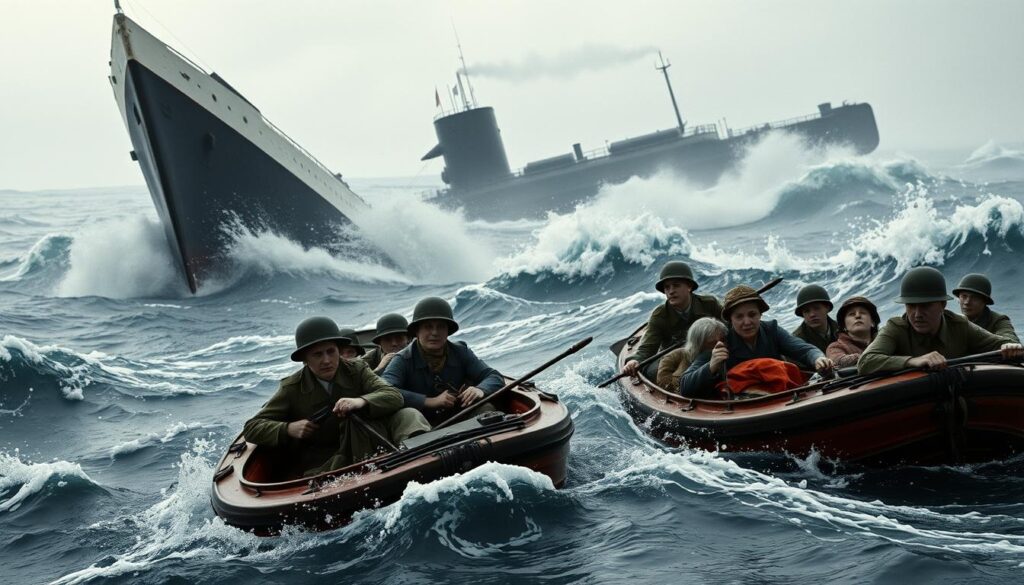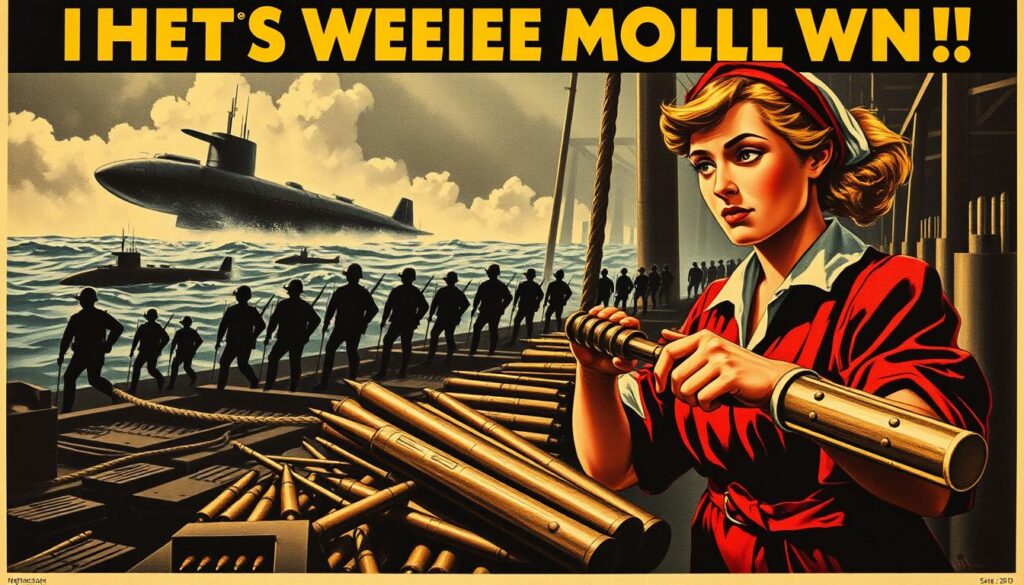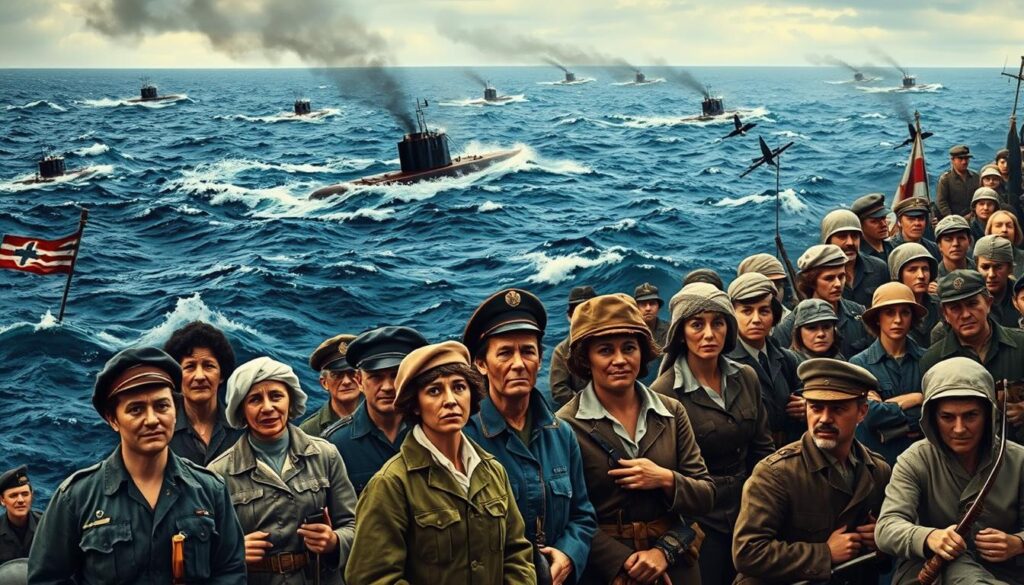In the early 20th century, the world was caught in a massive conflict known as World War I. The Allied Powers and Central Powers fought hard across Europe. Meanwhile, the United States stayed neutral at first. But, a series of key events pushed the U.S. into the war, changing everything.
So, how big was America’s role in World War I? And how did it affect the war’s outcome? Let’s explore the untold story of the United States’ crucial role in World War I.
Key Takeaways
- The United States maintained neutrality in the early stages of World War I, but a series of events led to its eventual entry into the conflict.
- President Woodrow Wilson’s leadership and the country’s growing preparedness movement played a crucial role in America’s decision to join the Allied Powers.
- The sinking of the Lusitania, unrestricted submarine warfare, and the Zimmermann Telegram were key catalysts that propelled the U.S. into the war.
- The American Expeditionary Forces, known as the “Doughboys,” made a significant contribution to the Allied victory, tipping the balance of power and hastening the end of the war.
- The U.S. entry into World War I had far-reaching consequences, both for the nation and the global order, shaping the 20th century and beyond.
America’s Path to World War I
As the Great War spread across Europe, the United States stayed neutral. President Woodrow Wilson wanted to keep the country out of it. But, more and more people started to question this decision.
Neutrality and Public Opinion
Many Americans backed President Wilson’s neutrality. They thought the U.S. should avoid the trench warfare in Europe. Yet, others, like politicians and business leaders, felt the U.S. had to help the allies against the Central Powers.
The Preparedness Movement
A movement called preparedness grew before the declaration of war in 1917. It pushed for a stronger U.S. military. Leaders like General John J. Pershing said the U.S. couldn’t stay neutral forever. They believed the country needed to protect its interests worldwide.
The argument over America’s role in the war grew louder. This set the stage for the events that would bring the U.S. into World War I.
Catalysts for U.S. Entry into World War I
The United States tried to stay out of World War I at first. But, a series of events changed public opinion and led to joining the Allies. The sinking of the Lusitania and Germany’s submarine attacks were key moments.
The Sinking of the Lusitania
On May 7, 1917, the Lusitania was torpedoed by a German U-boat off Ireland. This tragedy killed nearly 1,200 people, including 128 Americans. The outrage in the U.S. was huge, as it was seen as a cruel attack on civilians.
This event made relations between the U.S. and the Central Powers even worse. It set the stage for the U.S. to possibly enter the war.
Unrestricted Submarine Warfare
In early 1917, Germany started unrestricted submarine warfare. This meant German U-boats could attack any ship, including neutral ones, without warning. This move was a big challenge to the U.S. and other neutral countries.
The sinking of the Lusitania and Germany’s aggressive actions at sea made many Americans lose faith in staying neutral. This led to the U.S. joining the Allied Powers in 1917.
| Event | Date | Impact |
|---|---|---|
| Sinking of the Lusitania | May 7, 1917 | Outrage across the United States, strained relations with the Central Powers |
| Announcement of Unrestricted Submarine Warfare | Early 1917 | Challenged U.S. neutrality, further eroded public support for neutrality |

The sinking of the Lusitania and Germany’s submarine attacks were major reasons for the U.S. to join the Allied Powers in 1917. These events, along with others, played a big part in the U.S. decision to go to war. They also influenced the armistice and Treaty of Versailles.
The Zimmermann Telegram
In 1917, the United States was still neutral in World War I. But a secret message from Germany changed everything. The Zimmermann Telegram, caught by British spies, aimed to make the U.S. fight on two fronts.
German Foreign Minister Arthur Zimmermann sent the telegram. It suggested teaming up with Mexico and Japan against the allied powers. The goal was to get the U.S. into the war.
The message promised Mexico back its lost lands from the U.S. This, along with Germany’s unrestricted submarine warfare, made more Americans want to join the war.
The Zimmermann Telegram was a key moment. It showed Germany’s aggressive plans and broke American neutrality. The sinking of the Lusitania and Germany’s submarine attacks also pushed the U.S. to declare war in April 1917.
“The revelation of the Zimmermann Telegram was a significant moment that helped propel the United States towards joining the war effort.”
The telegram’s discovery stopped Germany’s plan to keep the U.S. out. It also helped in selling war bonds and propaganda for the allied powers. This event shows how important information and diplomacy were in World War I.
Mobilization and Military Readiness
As the United States prepared for World War I, the government made big moves. They focused on mobilizing resources and making sure the military was ready. Key steps included the Selective Service Act and using war propaganda and bonds.
The Selective Service Act
In 1917, Congress passed the Selective Service Act. It made military conscription a reality. All men aged 21 to 30 had to sign up for the draft.
This act was vital for the war effort. It ensured a steady flow of troops. Millions of men were called to serve in the armed forces.
War Propaganda and Bonds
The U.S. government also started a war propaganda campaign. It aimed to boost support for the war. The Committee on Public Information was formed to spread the message.
They used posters, films, and speeches to inspire patriotism. The government also sold war bonds. This let citizens contribute financially to the war.
These efforts, along with mobilization, prepared the U.S. for World War I. They set the stage for America’s important role in the war’s outcome.

“The Great War had a profound impact on American society, as the government’s mobilization efforts touched the lives of millions of citizens.”
U.S. entry into World War I
In 1917, the United States declared war on the Central Powers. This was a key moment in World War I. It was caused by German submarines sinking American ships and the Zimmermann Telegram, showing Germany’s plan to ally with Mexico.
The U.S. joining the war helped the Allied powers a lot. American troops, supplies, and money gave the Allies a big boost. This helped change the war’s direction and led to the Allies’ victory.
The U.S. helped the Allies in many ways. Millions of American soldiers were sent to fight. The U.S. also produced and sent important war materials. This support was key in defeating the Central Powers and making the U.S. a global leader.

